
 |
|
|
Please write: dan@dancooper.tv
Return to Page One
Register here to receive Fashion Finds
email updates!

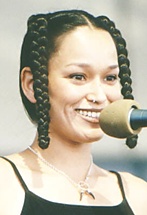 |
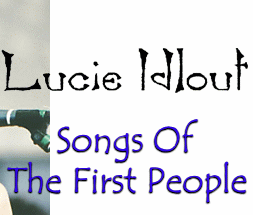 |
For info on Harry, click here.
One imagines such a place contains a special kind of beauty. Barren, yet full of the gentle colors that snow and ice reflect; quiet in the way frozen things are stilled, yet full of living creatures. Man and animals that can adapt to harsh climes, the deathless dark of winter, and the never-setting sun of its brief summer.
Lucie Idlout is an Inuit -- the people indigenous to the northernmost part of the world, spanning all the way from the tundra of Russia, across Alaska and Canada through to Greenland. While this beautiful frozen world is the scene of much of her lifescape, so has southern Canada been her home.
Lucie in an extraordinary young talent. She isn’t an issue singer; her songs are more self-examining. Proud and compassionate, Lucie won’t be hemmed in by labels. Yet her past rests strongly within her. Lucie wears a seal skin skirt when she performs, to create an awareness of the Inuit need to hunt seals for sustenance and clothing. Her unique point of view, her thoughtfulness and intelligence, her talent, and her great beauty, all have the potential to make her a star.
By the time you reach the end of the article,
you’ll see that at the age of 26, Lucie has already experienced love and loss,
life’s lessons, and has emerged a remarkable young woman.
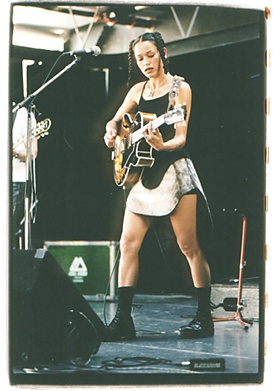 |
So I think probably by the time I was about fifteen, maybe even sixteen, I was completely turned off of music. I didn’t want to have anything to do with it. And then I bumped into my very first love, and he taught me my first couple of guitar chords.
And I guess it was shortly thereafter I realized that I wasn’t going to be with him for the rest of my life, and ...
FF: You usually aren’t at that age ...
Lucie Idlout: Don’t you know everything when you’re sixteen? I did. So it was then I wrote my first song. I actually lived with the guy, and I lived with him until I was about seventeen, and then sent him packing.
FF: Wow. So you started living with someone very young. Younger than most people do.
Lucie Idlout: I got my first apartment when I was sixteen.
FF: And your Mom was okay with letting you go out on your own?
Lucie Idlout: You know, my Mum, growing up, it was
probably very hard for her to sort of maintain a traditional way of raising your children,
living in an urban southern setting. But the Inuit way has always been that you guide your
children, but you don’t tell them what to do. You know? You encourage them to do the
right things, but you don’t stop them from making mistakes.
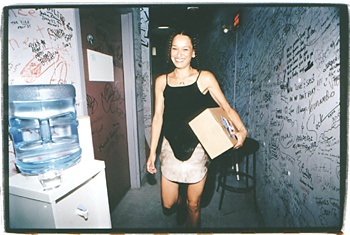 |
FF: It must be hard to apply those beliefs when one lives in an urban setting, don’t you think? Because there are urban dangers. I mean the cities are more dangerous than being in places where you don’t have to lock your front door.
Lucie Idlout: Exactly. No that’s absolutely true. I never lock my door; I never lock up my house. My front door is always open during the day, and at night. And you know, like depending on who you are for the most part, we don’t ring doorbells here. You just walk in.
FF: And what was your first song about? What was the subject matter?
Lucie Idlout: Well of course it was about my love that I wouldn’t be with for the rest of my life. I remember it being about the fact that I had a lot of growing up to do. And that I had things that I wanted to do with my life. I didn’t have these big dreams back then that I was going to be a musician, and I was sixteen, so it was probably written in the mentality of a sixteen year old. But you know basically, the song said, it didn’t work man. Let’s move on and hope we can be friends.
FF: And so once you wrote your first song, were you bitten by the bug, in the sense that you felt that you wanted to write another song, and another and another? Or was there a lapse?
Lucie Idlout: No actually, I think I played the same song over and over and over again for quite some time. Until I fell into my next relationship, and wrote another song about being in a relationship, right?
FF: So the men in your life have been a great inspiration for better or worse.
Lucie Idlout: Well I don’t know if you can call it inspiration. They’ve definitely ...
FF: They prompted you to write.
Lucie Idlout: They prompted me, yes.
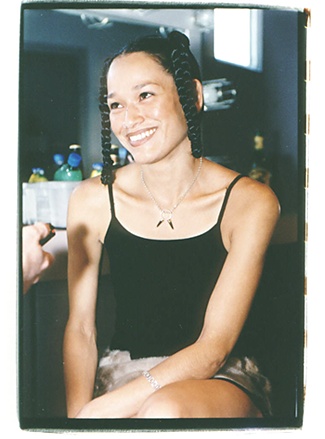 |
FF: And who were you listening to musically around this time, or even before, as a little kid? Who were some of the people you liked a lot?
Lucie Idlout: Chris de Burgh was my first big one. And then later on, when I was about thirteen or fourteen it was Brian Adams. And top 40 pop music. My tastes have changed considerably since then.
FF: And tell me now who you like to listen to, aside from yourself.
Lucie Idlout: Actually I’m the last person that I ever want to listen to. But I have some very personal favorites that include like Ella Fitzgerald.
FF: Oh, I love her too...
Lucie Idlout: I know, she’s great. Leon Redbone. I’m a huge fan of his. How do you feel about P.J. Harvey?
FF: I don’t know enough about her.
Lucie Idlout: Well, it’s angry woman music for the most part. But like it’s very passion driven, and she’s got balls, you know?
FF: Right, so it’s not contrived angry woman music like Alanis Morrissette?
Lucie Idlout: No. Which like -- I can’t stand her music.
FF: I can’t either.
Lucie Idlout: I will say that openly. I cannot stand Alanis Morrissette.
FF: And so then you had your second relationship, and you’re still living down south at this time. Right? And what other interests did you have? I mean were you still in school at this point, or when did you graduate college? Because high schools are different up there, right?
Lucie Idlout: Yeah.
FF: What age do you graduate?
Lucie Idlout: In the north you graduate in grade twelve; down south it’s grade thirteen. If you’re going on to university, grade twelve. I got as far as grade twelve.
FF: And so what -- you’re about seventeen, eighteen at that point?
Lucie Idlout: About seventeen. One of my big things
back then was horseback riding. Actually I dropped out of high school to horseback ride.
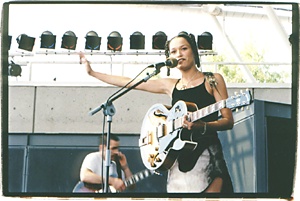 |
FF: No kidding.
Lucie Idlout: All I wanted to do was ride horses all the time. I went and rode horses every day. It was a great reason to leave school.
FF: And I think I read somewhere that you’ve also acted and danced as well.
Lucie Idlout: The way I got into acting actually was from dancing. There’s a pavilion in Toronto at the CNE, and every year it showcases a different culture from a different country. But that year they stayed home, and let it be the Inuit Pavilion.
So they showcased Inuit culture from all across the Arctic. And what we did is we got together a collection of I don’t know how many pieces of clothing, and showcased, and put on a show of clothing that were both traditional and contemporary. And it was shown through dance.
FF: How wonderful.
Lucie Idlout: Yeah, it was great. And it was a show that we did for maybe even a month. We did about three shows a day, and I had the time of my life.
And I think it was from there we did a couple of more shows for the National Aboriginal Achievement Awards and a couple of other things. And it was from there that I found out about the Native Theater School that’s put on through the Center for Indigenous Theater outside of Toronto.
And so I applied, never expecting to get in. Because they get like two or three hundred applicants every single year from Canada and the States. And I had to submit my audition, video audition you know, and essay, and all that stuff. And I got the phone call one day that I was in. And it changed my life.
FF: Yes, yes.
Lucie Idlout: I didn’t actually pursue theater after that, except that I’ve put on two productions here since then. And they were really, really well attended, and really well received. But I think that just basically gave me the confidence to be able to get up on stage and put on a show.
email Fashion Finds by clicking here.
Special thanks to
Rosalind Cutforth for
introducing us to the work of
Native American artists and designers.